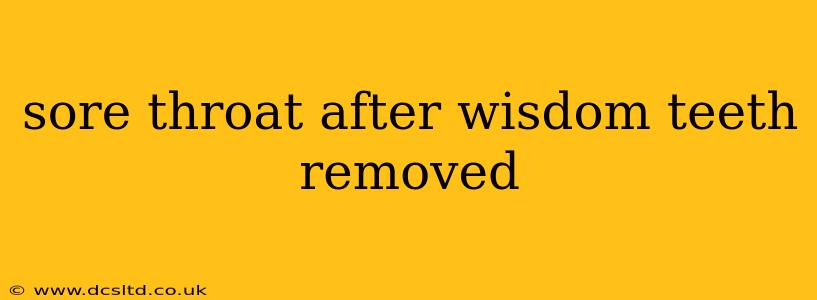Having your wisdom teeth removed is a common procedure, but it often comes with some post-operative discomfort, and a sore throat is a frequent complaint. This comprehensive guide will explore the reasons behind a sore throat after wisdom teeth extraction, how to manage the pain, and when to seek professional medical attention.
Why Do I Have a Sore Throat After Wisdom Teeth Removal?
A sore throat following wisdom teeth removal isn't a surprising complication. Several factors contribute to this common post-operative symptom:
- Irritation from the surgery: The surgical instruments and the removal process itself can irritate the tissues in your mouth and throat. This irritation triggers inflammation, leading to soreness.
- Swelling: Swelling in the back of your mouth and throat is a natural response to the trauma of surgery. This swelling can put pressure on your throat muscles, causing discomfort and pain.
- Dry mouth: Many patients experience dry mouth after wisdom teeth extraction, especially due to the effects of anesthesia. Dryness can irritate the throat and make it feel scratchy and sore.
- Mouth breathing: If your jaw is swollen or painful, you might breathe through your mouth more often. This can lead to a dry throat and exacerbate the soreness.
- Infection: In rare cases, a sore throat might signal an infection. While less common, it's crucial to be aware of this possibility.
How Long Will My Sore Throat Last After Wisdom Teeth Removal?
The duration of a post-operative sore throat varies from person to person. Generally, you can expect the soreness to improve within a few days. For most individuals, the discomfort should subside significantly within 3-7 days. However, some lingering mild soreness might persist for up to two weeks. If the pain is severe or doesn't improve, consulting your dentist or oral surgeon is vital.
How Can I Treat a Sore Throat After Wisdom Teeth Removal?
Managing a sore throat after wisdom teeth extraction involves gentle care and pain relief strategies. Here are some helpful approaches:
- Saltwater rinses: Gently rinsing your mouth with warm saltwater (1/4 teaspoon salt in 8 ounces of warm water) several times a day can help clean the surgical site and soothe the throat. Avoid forceful rinsing or gargling, as this can dislodge blood clots.
- Over-the-counter pain relievers: Ibuprofen or acetaminophen can effectively manage pain and reduce inflammation. Always follow the dosage instructions on the packaging.
- Hydration: Staying well-hydrated is crucial for healing. Drink plenty of fluids, especially water, to keep your throat moist and prevent dryness. Avoid alcohol and caffeine, which can dehydrate you.
- Rest: Giving your body adequate rest allows it to focus on healing. Avoid strenuous activities and get plenty of sleep.
- Soft foods: Opt for soft, easily digestible foods that won't irritate your throat or surgical site. Examples include soups, mashed potatoes, yogurt, and applesauce.
- Avoid acidic or spicy foods: These can irritate your already sore throat.
Is a Sore Throat After Wisdom Teeth Removal a Sign of Infection?
While a sore throat is often a normal part of the recovery process, it's crucial to recognize the signs of a potential infection. Contact your dentist or oral surgeon immediately if you experience:
- Severe, persistent pain: Pain that doesn't respond to over-the-counter pain relievers.
- High fever: A temperature of 101°F (38.3°C) or higher.
- Increased swelling: Significant swelling that continues to worsen after a few days.
- Pus or unusual discharge: Noticeable pus or a foul-smelling discharge from the surgical site.
- Difficulty swallowing: Significant trouble swallowing food or liquids.
What if My Sore Throat Doesn't Improve After a Week?
If your sore throat persists beyond a week or worsens, it's essential to seek professional medical attention. Your dentist or oral surgeon can assess your condition and provide appropriate treatment if necessary. Delayed treatment of an infection could lead to more serious complications.
Can I Gargle With Mouthwash After Wisdom Teeth Removal?
It's generally recommended to avoid mouthwash, especially alcohol-containing mouthwashes, immediately after wisdom teeth removal. The alcohol can irritate the surgical site and interfere with the healing process. Your dentist may recommend a specific mouthwash for use after a certain point in your recovery. Always follow your dentist's instructions.
This information is for general knowledge and does not constitute medical advice. Always consult your dentist or oral surgeon for personalized guidance and treatment regarding your specific situation.
